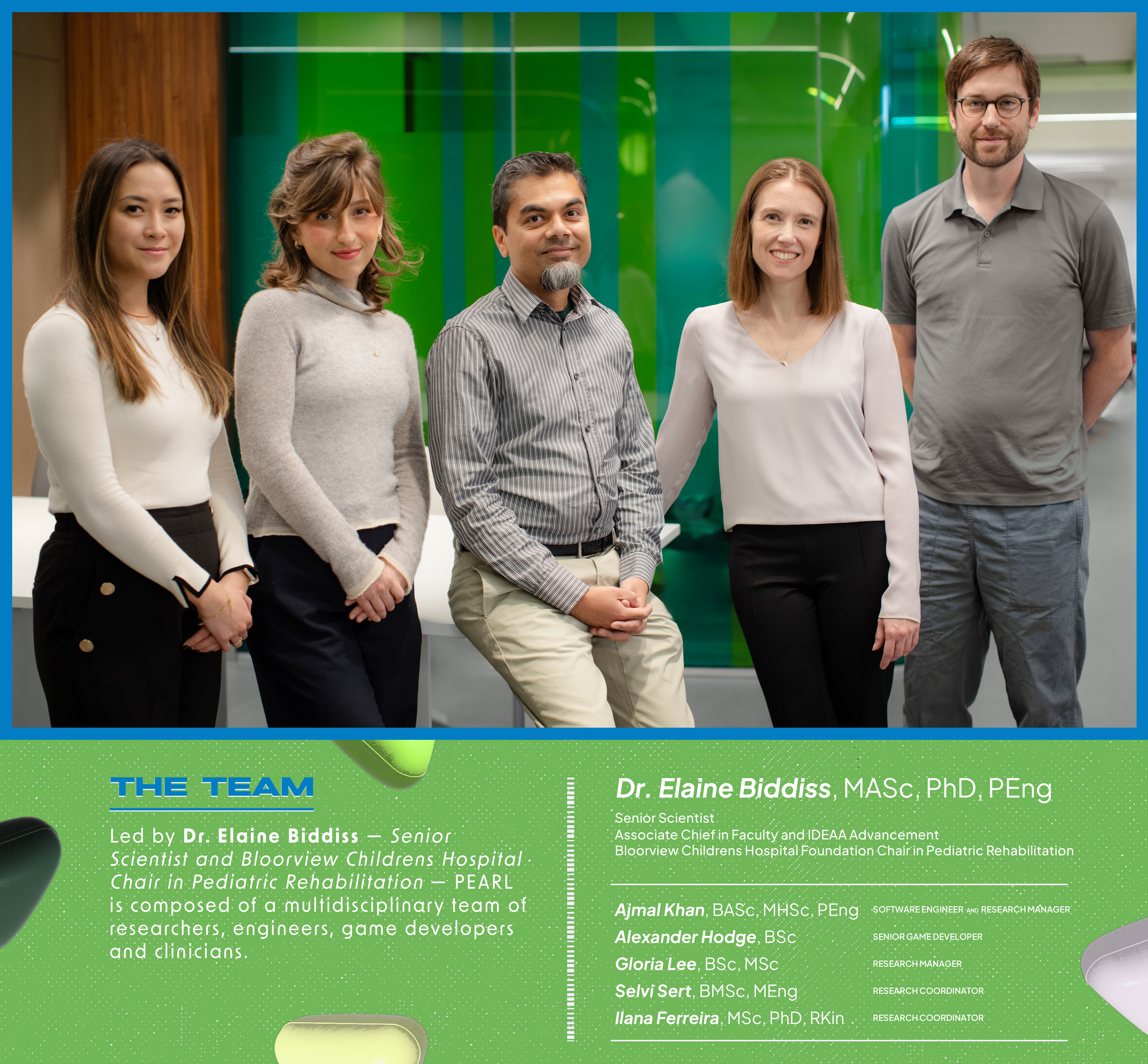Our Team
PEARL Senior Scientist | Bloorview Childrens Hospital Chair in Pediatric Rehabilitation
Dr. Elaine Biddiss, MASc, PhD, PEng
Ajmal Khan, BASc, MHSc, PEng | Research Manager
Gloria Lee, BSc, MSc | Research Manager
Alexander Hodge, BSc | Senior Game Developer
Selvi Sert, BMSc, MEng | Research Coordinator
Ilana Ferreira, MSc, PhD, RKin | Research Coordinator

CURRENT STUDENTS
Marina Petrevska, BSc, MScPT | PhD Candidate (2020 Sept - Present)
Nikki Ponte, BA/BSc, MSc | PhD Candidate (2021 Sept - Present)
Sorsha Asady, BSc | MASc Candidate (2023 Jan - Present)
Michael Lam, BSc | MASc Candidate (2024 Jan - Present)
ALUMNI
Dr. Ilana Naiman (2023 Mar - 2024 Mar)
Evaluation of a Library Lending Program for Rehabilitation Technology; Measuring Functional Use of the Hemiplegic Hand During AHA Using Wearable Accelerometers; Measuring Functional Hand Use in Activities of Daily Living Using Wearable Accelerometers.
Dr. Hamilton Hernandez (2015 Jan - 2016 Oct)
Supporting Social Play in Virtual Reality Therapies.
Daniela Chan-Viquez (2018 Sept - 2023 Dec), University of Toronto.
Clinical Evaluation of Interactive Computer Play as a Therapeutic Intervention for Children with Cerebral Palsy.
Ali Mojdeh (2018 Sept - 2020 Feb), University of Toronto.
Return to Play after concussion - Development and Evaluation of a Simulated Sports Virtual Environment to Assist in Clinical Decision-Making.
Alex Macintosh (2016 Sept - 2020 Jan), University of Toronto.
Biofeedback to Prevent Compensatory Movements in Motor Therapies for Children with Cerebral Palsy.
- Soowan Choi (MASc, 2021 - 2023), Developing Integrated Assessment Metrics within a Movement-Tracking Video Game Platform for Motor Learning.
- Sunaal Mathew (MASc, 2019 - 2021), Measuring Functional Hand Use in Children with Hemiplegia using Accelerometers and Machine Learning.
- Danielle DuPlessis (MSc, 2019 - 2021), R2Play and clinician needs: fostering user-driven technology that supports return-to-play decision making.
- Emily Lam (MSc, 2019 - 2021), Wearable sensors for physiological measurement during a simulated sports concussion assessment.
- Brandon Rufino (MSc, 2019 - 2021), Creating and evaluating an audio detection interface for musical play and learning with low-cost at home musical instruments.
- Mike Gray (MASc, 2015 - 2017), Development of a new interactive board game for hand and arm therapy for children with Cerebral Palsy.
- Tara Joy Knibbe (MASc, 2013 - 2015), Stakeholders' perspectives in the design of an innovative technology to improve physical activity in youth with physical disabilities.
- Danica Kryrllo (MHSc, 2011 - 2013), Musical Gait – a biomechanical feedback and measurement system for gait training.
- Lian Ni (MHSc, 2011 - 2013), The Xbox Kinect as a platform for virtual reality therapies.
- Oggie Finci (MEng, 2011 - 2012), Design of a single-legged ergometer for cardiopulmonary rehabilitation.
- Ajmal Khan (MHSc, 2011 - 2012), Musical Stairs – a motivational and clinical assessment tool.
- Fanny Hotze (MASC Internship, 2010 - 2011), Design of an interactive and inclusive arts installation for a clinic waiting room space.
- Elizabeth Han (MASc, 2009 - 2011), Bio-songs: Interpreting physiological changes through music.
- Jennifer Howcroft (MHSc, 2009 - 2011), Active video games for physical activity promotion in children with disabilities.
- Delbert Hung (MASc, 2009 - 2011), Ecological factors in emotion recognition using physiological signals.
- Elisa Du (BSc, Summer 2019), Machine learning classification of hand gestures using low-cost wearable electromyography during therapy video game play.
- Kashish Verma (BEng, 2018-2019), Project Falcon - developing a home-based hand/arm exerciser.
- Emily Lam (BEng, 2016-2017), Assisted in the scoping review done on biofeedback.
- Stephanie Chan, (BHSc, Summer 2016), Detecting anxiety through song: Mapping physiological indicators to music.
- Annie Lopez (BScE, Summer 2015), Designing video game controllers that target fine motor movements.
- Alan Wu (BASc, 2015-2016), Beyond hand controllers - accessing commercial video games through therapeutically relevant movements.
- Maritza Basaran (BA, Summer 2014), Story-based video game: a motivational pathway to home-based therapy.
- Howard Chiam (BEng, Summer 2014), Development of therapeutic video games using haptic feedback.
- Sergio Zerbetto Masson (BEng, Summer 2014), Design of mixed-reality games for children with cerebral palsy.
- Selena Rikley (BEng, Summer 2014), Participatory design: Improving interactive video games for virtual reality therapies.
- Ho Lun (Helen) Tsoi (BEng, Summer 2014), Development of therapeutic video games using haptic feedback.
- Tyler Berry (BASc, Summer 2011), Nintendo Wii – biomechanics and variations in play styles.
- Stephanie Cheung (BEng, Summer 2011), Biosongs – a physiological-musical mapping system for detection of anxiety.
- Hasmita Singh (BASc, 2010-2011), Physiological indicators of anxiety in children.
- Jomy Varghese (BSc, Summer 2010), A wearable toy for measurement of functional hand use in children with hemiplegic cerebral palsy.
- Jack Liang (BASc, 2009-2010), A wearable device to characterize use of the hemiplegic hand in activities of daily living.
- Miaad Aliroteh (BASc, Summer 2009), Bio-wear: ubiquitous physiological monitoring.
- Philip Perivolaris (BASc, Summer 2009), The living wall: An accessible multimedia environment for children with disabilities.
- Tara Khiabani (BASc, 2008-2009), Wearable device for measurement of wrist extension in activities of daily living for children with hemiplegic cerebral palsy.
- Zhe Li (BASc, 2008-2009), Wearable device for measurement of wrist extension in activities of daily living for children with hemiplegic cerebral palsy.
- Jordan Silverman (BASc, Summer 2006), Game-based trainer for use in pediatric myoelectric prostheses.